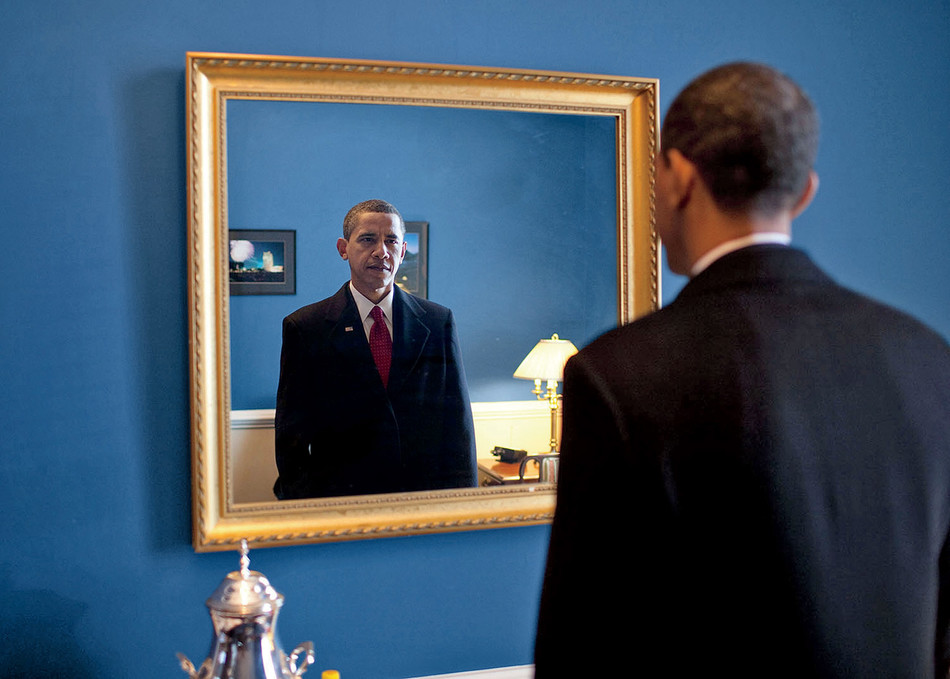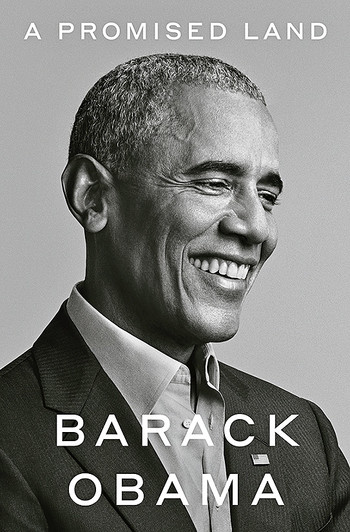Anyone who has read the earlier books of Barack Obama ’83CC — particularly Dreams from My Father — already knows that he’s a wonderful writer, with an eye for telling detail and a voice that is by turns introspective, witty, self-deprecating, uplifting, elegiac, and laugh-out-loud funny. Those qualities are showcased once again in A Promised Land, the first of the forty-fourth president’s projected two-volume memoir, which focuses on Obama’s role as a husband and father and his pursuit of a political career up to and including his first term in the White House.
Reading A Promised Land resembles nothing so much as the heady, pulse-quickening experience of taking an honors seminar with the hands-down best professor on campus (who also happens to be the former leader of the free world). The Obama we encounter here is dazzling — a master educator at the top of his game who entertains, informs, clarifies, enlightens, inspires, and often soars to near-poetry in his thoughtful explorations of thorny topics. In A Promised Land, Obama’s uncanny knack for synthesizing and condensing difficult concepts and complex histories produces a rolling montage of one “aha” moment after another. Check out his analysis of why fundamentalist Islam has become so dominant in the twentieth and twenty-first centuries; it is a marvel of compression and clarity. (He traces the movement to Abdulaziz Ibn Saud, who founded modern Saudi Arabia in 1932 on the principles of an “uncorrupted” form of Islam promulgated by an eighteenth-century cleric.) Want a précis of how health care became such a hot mess in the USA — a mess that, in 2009, desperately cried out for a cure? Read his lead-in to the riveting tale of how he and his team (David Axelrod, David Plouffe, Robert Gibbs, Rahm Emanuel, and a host of other vividly drawn characters) — with the help of a not-so-secret weapon named Nancy Pelosi — manage to pass the Affordable Care Act (ACA) without a single Republican vote.
An account of the Deepwater Horizon disaster of April 2010 — one of a series of crises that beset his new administration — gives rise to some of Obama’s most virtuosic feats of illumination. He describes the proliferation of offshore drilling (“by 2010 more than three thousand rigs and production platforms sat off the coasts of Texas, Louisiana, Mississippi, and Alabama, dotting the horizon like castles on stilts”) and explains in elegant, lucid prose the improbable technology underlying it. Along the way he underscores the sheer arrogance, addiction to risk, and near-insanity of petrochemical companies that spend upward of a million dollars a day to operate a single rig dedicated to “siphoning up the remains of the ancient plants and animals converted by nature into the viscous black gold pooled beneath the ocean floor” at depths exceeding “the height of Mount Everest.” When one of these rigs, the thirty-story-high Deepwater Horizon, explodes in a huge ball of fire in an American section of the Gulf of Mexico, injuring seventeen of the 126 people onboard and leaving eleven platform workers permanently unaccounted for, it results in a catastrophic oil spill that dwarfs all others in US history. And none of this, Obama fumes, will ever change, “because at the end of the day we Americans loved our cheap gas and big cars more than we cared about the environment.”
That last rant notwithstanding, Obama is no firebrand (though he’s often accused of being one by critics on the right and expected to be one by hopeful backers on the left); by his own reckoning, he’s “a reformer, conservative in temperament if not in vision.” As such he enters the White House intent on forging some sort of bipartisan consensus (he even asks Robert Gates, George W. Bush’s secretary of defense, to stay on in that position — though his efforts at bipartisan compromise ultimately prove fruitless). Yet he is equally determined, as he recently told the Atlantic’s Jeffrey Goldberg, “to hang on to who I am — my soul, my sense of right and wrong, my character — while operating at the highest level of politics.”
This idealism, while challenged, never flags — but it nearly always makes room for a clear-eyed realism. (“What is it about sixty votes these folks don’t understand?” Obama snaps, understandably irked, when Howard Dean and others rail at him for not including a public option in the ACA that would surely have doomed it.) Still, in passages like those dealing with the Deepwater Horizon, his depictions of his family (rendered throughout with palpable tenderness and love), and his deliberations over whether to save the lives of some teenage Somali terrorists, Barack Obama leaves readers with little doubt that after eight bruising years in the White House, his soul remains very much intact.
Volume Two cannot arrive fast enough.




